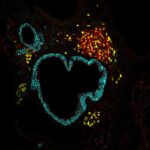
Publication: High mTOR activity is a hallmark of reactive natural killer cells and amplifies early signaling through activating receptors
Published in: eLife, 2017, 6, ⟨10.7554/eLife.26423⟩
Authors: Antoine Marçais, Marie Marotel, Sophie Degouve, Alice Koenig, Sebastien Fauteux-Daniel, Annabelle Drouillard, Heinrich Schlums, Sebastien Viel, Laurie Besson, Omran Allatif, Mathieu Blery, Eric Vivier, Yenan Bryceson, Olivier Thaunat, Thierry Walzer
Summary
NK cell education is the process through which chronic engagement of inhibitory NK cell receptors by self MHC-I molecules preserves cellular responsiveness. The molecular mechanisms responsible for NK cell education remain unclear. Here, we show that mouse NK cell education is associated with a higher basal activity of the mTOR/Akt pathway, commensurate to the number of educating receptors. This higher activity was dependent on the SHP-1 phosphatase and essential for the improved responsiveness of reactive NK cells. Upon stimulation, the mTOR/Akt pathway amplified signaling through activating NK cell receptors by enhancing calcium flux and LFA-1 integrin activation. Pharmacological inhibition of mTOR resulted in a proportional decrease in NK cell reactivity. Reciprocally, acute cytokine stimulation restored reactivity of hyporesponsive NK cells through mTOR activation. These results demonstrate that mTOR acts as a molecular rheostat of NK cell reactivity controlled by educating receptors and uncover how cytokine stimulation overcomes NK cell education.
Link to HAL – amu-01905669
Link to DOI – 10.7554/eLife.26423

